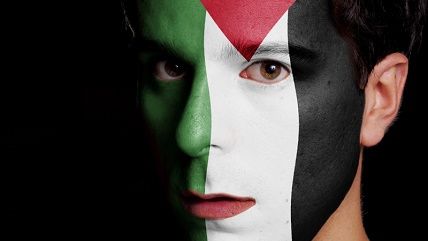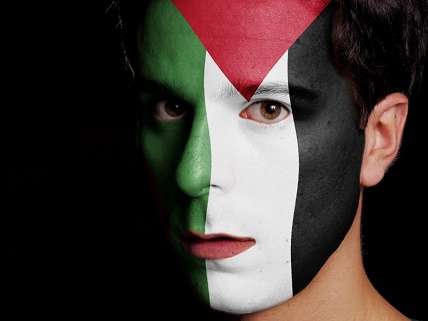GWU Police Ordered a Student to Remove the Palestinian Flag from His Dorm Window
How the language of 'safe spaces' can be used to silence political speech.


At George Washington University, students can hang flags in their dormitory room windows—unless someone is offended. In recent months, GWU police ordered a student to take down the Palestinian flag because it's not "respectful of your peers," according to an administrator.
This incident should serve as a powerful reminder that right-leaning students are not the only victims of the crusade to criminalize offensive expression on college campuses. In fact, at many universities where pro-Israeli forces have institutional power, liberal pro-Palestinian students are often victims of egregious censorship.
Ramie Abounaja, a 20-year-old pre-med student, was visited by a GWU police officer in late October. The officer claimed he had received "numerous complaints" about the flag and wouldn't leave the room until it was removed. Abounaja complied, but later questioned whether he had actually violated any university policies. According to the student:
Then, on Tuesday, to my alarm, I received an email from the Graduate Fellow Office of Student Rights and Responsibilities stating that they "received a report from the GW University Police Department regarding [my] behavior" that I was "found to have had a flag out [my] window" and that the letter "serves as a warning that this behavior is a violation of the 'Code of Student Conduct and/or the Residential Community Conduct Guidelines.'" The letter also warned me to be "respectful" of my "peers" that "my behavior had the potential to leave a profound impact on the community." The letter (attached) did not provide any details as to which provision, article or rule I violated.
Though GWU is a private university, a blanket prohibition on flags in windows would certainly eradicate even the semblance of protected free expression for students. Surely the right to hold and share political opinions is among the most important rights all students should enjoy.
But GWU does not have such a prohibition. Indeed, The Intercept's Andrew Fishman noted that numerous flags can be seen flying in GWU dorm windows.* It would seem, then, the police are only dispatched to remove flags that have offended others.
This is almost worse than a blanket prohibition on flags in windows, frankly. It empowers students to use the language of emotional discomfort to selectively censor speech—relevant political speech, at that.
Abounaja is certainly a victim of viewpoint discrimination. This kind of censorship—censorship of pro-Palestinian speech—is common according to Fishman:
Campus free speech and so-called "political correctness censorship" have been vigorously debated over the last two decades. That topic received particularly intense attention from journalists and pundits this year in response to controversies at the University of Missouri, Yale and other campuses.
But notably, many of the loudest "anti-PC" voices are silent about threats to pro-Palestinian speech, even though that is the speech that is arguably the greatest and most common target for official campus suppression. Palestine Legal, a U.S. civil rights advocacy organization, reports 140 instances of suppression of Palestine advocacy in the first six months of 2015, 80 percent of which on college campuses.
Fishman cites two other noteworthy examples: the University of Illinois at Urbana-Champaign fired Professor Steven Salaita for his anti-Israel tweets, and the University of California is attempting to label all criticism of the state of Israel as anti-Semitic hate speech.
I suspect it's true that some of the loudest anti-PC voices are less likely to denounce the all-too-common censorship of pro-Palestinian students. On the other hand, I have no idea whether pro-Palestinian speech is "arguably the greatest and most common target" of censorious forces on campuses.
But we shouldn't concern ourselves too much with figuring out who is the biggest loser in the campus free speech wars. If one person's free expression rights can be crushed underfoot by an overzealous administrator, campus security officer, or emotionally insecure student, then everyone on campus is in danger. Since "hateful" and "offensive" are relative terms, we cannot protect the kinds of speech we find agreeable unless we also safeguard the kinds of speech we utterly despise.
At the University of Michigan, a Jewish student was recently investigated by a student government ethics commission after Palestinian students took offense at him aggressively criticizing a pro-Palestinian display. Thankfully, the commission affirmed that the student had a First Amendment right to question the demonstrators, according to The College Fix. George Washington University should similarly affirm the right of Palestinian students to hang flags in their dorm windows, and universities everywhere should make it clear that the protection of feelings does not trump free expression for Palestinians, Jewish students, or any other ethnic, religious, political, or social group.
Related: "Do College Students Hate Free Speech? Let's Ask Them."
*Fishman did not visit GMU himself, but students sent him photographic evidence of such flags.


Show Comments (154)